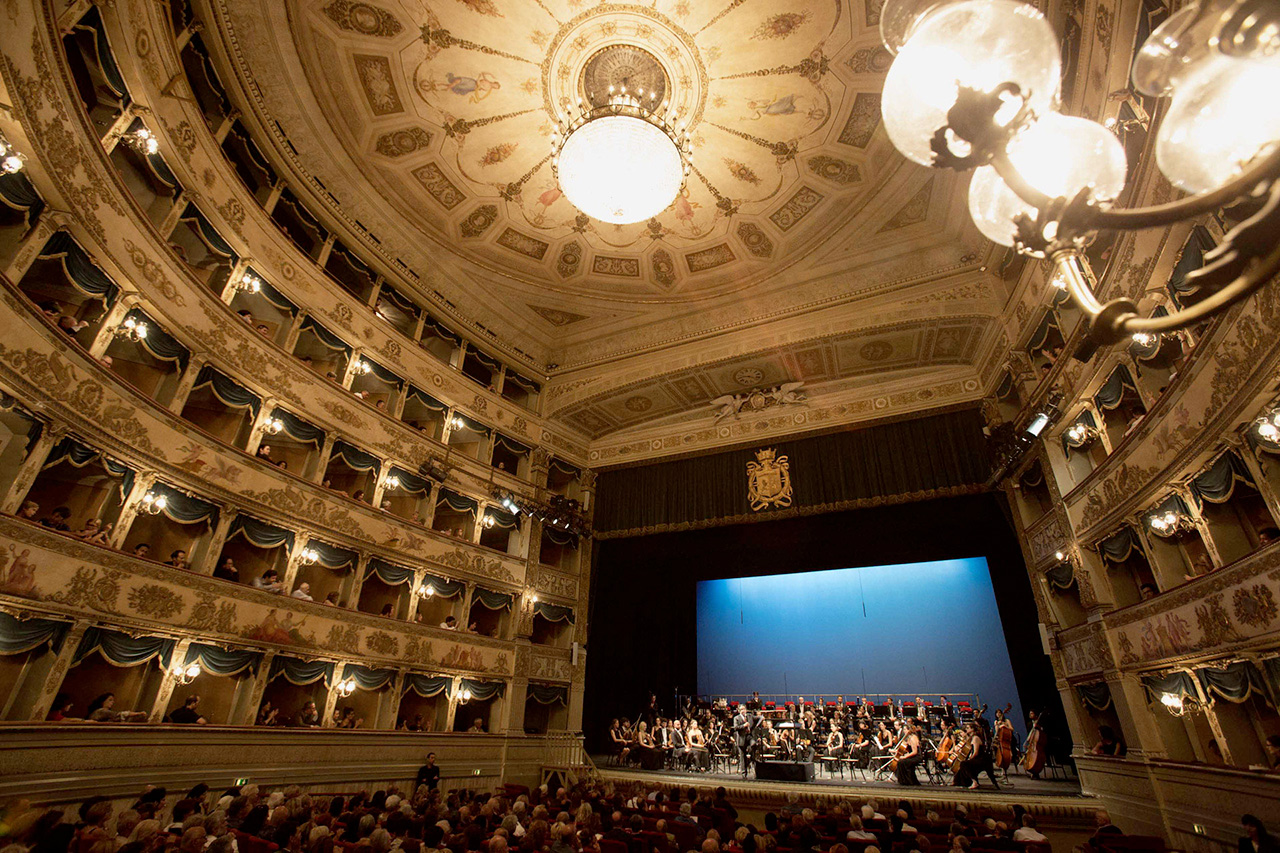ph. Zani-Casadio
Autumn Trilogy
Nabucco
opera in four acts
libretto Temistocle Solera
from the play Nabuchodonosor by Auguste Anicet-Bourgeois and Francis Cornu
and from the ballet Nabuccodonosor by Antonio Cortesi
music Giuseppe Verdi
(Universal Music Publishing Ricordi srl, Milano)
Nabucco Serban Vasile
Ismaele Riccardo Rados
Zaccaria Evgeny Stavinski
Abigaille Alessandra Gioia
Fenena Lucyna Jarząbek
Abdallo Giacomo Leone
Anna Renata Campanella
High Priest of Ion Stancu
conductor Alessandro Benigni*
direction and concept Cristina Mazzavillani Muti
light design Vincent Longuemare
visual designer Davide Broccoli
visual consultant Paolo Miccichè
sound designer Alessandro Baldessari
costume design Alessandro Lai
Orchestra Giovanile Luigi Cherubini
Coro Lirico Marchigiano “Vincenzo Bellini”
choirmaster Martino Faggiani
other choirmaster Massimo Fiocchi Malaspina
“DanzActori” Trilogia d’autunno
stage manager Luigi Barilone
répétiteur Davide Cavalli
set designLaboratorio del Teatro Alighieri
costumi Tirelli Costumi Roma footwear Calzature d’Arte Pedrazzoli srl
new production
co-production Ravenna Festival, Teatro Alighieri di Ravenna, Teatro Comunale di Ferrara
* Ravenna, 16 November 2018 – Ravenna Festival announces that Maestro Pietro Borgonovo has decided to leave the production of the Nabucco for health reasons. The Direction of the Festival thanks Maestro Borgonovo for his work during the weeks of rehearsals with the singers and the orchestra, and wishes him a swift recovery.
In substitution of Maestro Borgonovo for the next rehearsals and oncoming performances, conductor Alessandro Benigni – who has been involved in the whole Trilogy as a répétiteur and in the work with the singers – has been appointed. The Festival thanks Maestro Benigni for his prompt availability, that ensures the continuity of the production, on stage at the Alighieri Theatre on November 23, 27, and 30.
A new lyric marathon: three operas performed on the same stage on consecutive nights, tight rhythms and a workshop that plays on invention and creativity matching young talents and modern technologies. This is the Autumn Trilogy, which once again delves into Verdi’s world and genius, transforming the stage of the Alighieri Theatre into a true “opera factory” giving body and voice to three different steps in the composer’s artistic career. A new production alongside two creations from the “repertoire” of past Autumn Trilogies, in an ideal journey from the biblical, choral inspiration of Nabucco to the beacon of light out of darkness kindling the soul of Rigoletto, down to the dramatic colour contrast that unites/separates Otello and Desdemona.
A trilogy intended to retrace Verdi’s extraordinary creative career had to start with Nabucco (1841), the opera through which the composer managed to overcome fate’s adversity and get his life back on track as a man and a musician. An opera whose biblical and prophetic dimension culminates in a choral tapestry capable of incorporating different individualities into an ideal union of peoples and nations. This score laid the basis for Rigoletto (1851), which soon became the first part of a “popular trilogy” and the author’s own favourite work because of the vivid description of the protagonist within a perfect dramatic unity. And, after all, Nabucco also laid the foundations for the entirely renewed conception of Otello (1887), inspired by Shakespeare, the inevitable culmination of Verdi’s search for “climactic words” (parola scenica).


